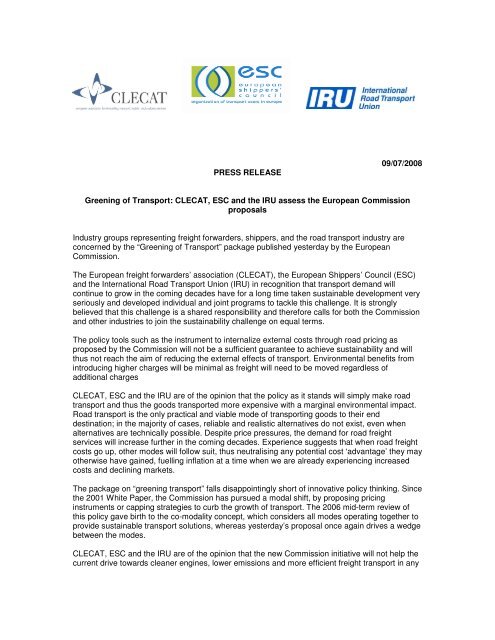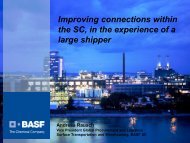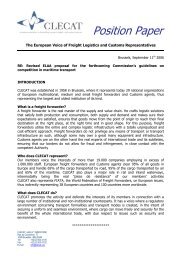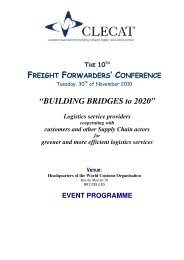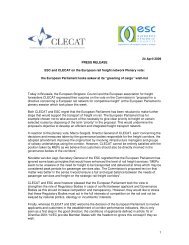CLECAT, ESC & IRU joint press release
CLECAT, ESC & IRU joint press release
CLECAT, ESC & IRU joint press release
You also want an ePaper? Increase the reach of your titles
YUMPU automatically turns print PDFs into web optimized ePapers that Google loves.
PRESS RELEASE<br />
09/07/2008<br />
Greening of Transport: <strong>CLECAT</strong>, <strong>ESC</strong> and the <strong>IRU</strong> assess the European Commission<br />
proposals<br />
Industry groups representing freight forwarders, shippers, and the road transport industry are<br />
concerned by the “Greening of Transport” package published yesterday by the European<br />
Commission.<br />
The European freight forwarders’ association (<strong>CLECAT</strong>), the European Shippers’ Council (<strong>ESC</strong>)<br />
and the International Road Transport Union (<strong>IRU</strong>) in recognition that transport demand will<br />
continue to grow in the coming decades have for a long time taken sustainable development very<br />
seriously and developed individual and <strong>joint</strong> programs to tackle this challenge. It is strongly<br />
believed that this challenge is a shared responsibility and therefore calls for both the Commission<br />
and other industries to join the sustainability challenge on equal terms.<br />
The policy tools such as the instrument to internalize external costs through road pricing as<br />
proposed by the Commission will not be a sufficient guarantee to achieve sustainability and will<br />
thus not reach the aim of reducing the external effects of transport. Environmental benefits from<br />
introducing higher charges will be minimal as freight will need to be moved regardless of<br />
additional charges<br />
<strong>CLECAT</strong>, <strong>ESC</strong> and the <strong>IRU</strong> are of the opinion that the policy as it stands will simply make road<br />
transport and thus the goods transported more expensive with a marginal environmental impact.<br />
Road transport is the only practical and viable mode of transporting goods to their end<br />
destination; in the majority of cases, reliable and realistic alternatives do not exist, even when<br />
alternatives are technically possible. Despite price <strong>press</strong>ures, the demand for road freight<br />
services will increase further in the coming decades. Experience suggests that when road freight<br />
costs go up, other modes will follow suit, thus neutralising any potential cost ‘advantage’ they may<br />
otherwise have gained, fuelling inflation at a time when we are already experiencing increased<br />
costs and declining markets.<br />
The package on “greening transport” falls disappointingly short of innovative policy thinking. Since<br />
the 2001 White Paper, the Commission has pursued a modal shift, by proposing pricing<br />
instruments or capping strategies to curb the growth of transport. The 2006 mid-term review of<br />
this policy gave birth to the co-modality concept, which considers all modes operating together to<br />
provide sustainable transport solutions, whereas yesterday’s proposal once again drives a wedge<br />
between the modes.<br />
<strong>CLECAT</strong>, <strong>ESC</strong> and the <strong>IRU</strong> are of the opinion that the new Commission initiative will not help the<br />
current drive towards cleaner engines, lower emissions and more efficient freight transport in any
way. There is a common concern that the principle of strict earmarking may not be finally<br />
adopted, thus failing to achieve the goal of addressing externalities altogether.<br />
Commenting on the Commission Communication, <strong>ESC</strong> Secretary General Nicolette van der Jagt<br />
said: “The main issue is that the EC wish to address congestion in order to tackle local pollution<br />
(air and noise) and also emissions of GHGs such as CO2 - and yet their hands are being tied by<br />
members states - such that they can only suggest rather than mandate that the internalising of<br />
such costs should be extended to the private vehicle sector - the part of road transport that<br />
contributes the lion share of CO2, congestion and noise impacts on society! How ironic is that!”<br />
Bertil Dahlin, President of the <strong>IRU</strong> EU Goods Transport Liaison Committee, added: “We<br />
recognise that transport like any human activity causes externalities, which we all have a shared<br />
responsibility to mitigate now and in the future. As a matter of fact, the road transport industry has<br />
taken effective “at source” technical measures and adopted operational practices that have, for<br />
instance, reduced the fuel consumption of commercial vehicles by 36% since 1970 and toxic<br />
emissions by 97%. The Commission should have introduced a sound and objective cost-benefit<br />
analysis based on the Cheapest Cost Avoider principle as a prerequisite for internalising external<br />
costs, which would ensure that externalities would be reduced at source with a truly sustainable<br />
outcome.”<br />
Marco Sorgetti, Director General of <strong>CLECAT</strong> said: “We cannot cut back on demand for road<br />
transport, as there are no realistic alternatives. Today’s proposals from the Commission, in spite<br />
of their optimistic business-as-usual tone, require considerable caution: they stem from<br />
observations carried out in a different economic climate. Today, with higher logistics costs, the<br />
risk of stagflation and economic decline, the last thing we need is an additional spin, when the<br />
wheel is turning too fast already.”<br />
Finally, <strong>CLECAT</strong>, <strong>ESC</strong> and the <strong>IRU</strong> repeat that they have all called on the Commission to apply<br />
the internalisation of external costs simultaneously to ALL modes of transport. Until there is equal<br />
and neutral treatment in all modes, with equivalent measures (in proportion to the externalities of<br />
each mode), they see no justification for the urgency to place additional charges on road freight<br />
with a rushed revision of the Eurovignette directive.<br />
* * *<br />
Press contacts:<br />
<strong>IRU</strong>: Juliette Ebélé, +41 22 918 27 07, Press@iru.org<br />
<strong>ESC</strong>: Nicolette Van der Jagt, + 3222302113, nicolettevdjagt@europeanshippers.be<br />
<strong>CLECAT</strong>: Marco L. Sorgetti, +3225034705, sorgetti@clecat.org<br />
2


